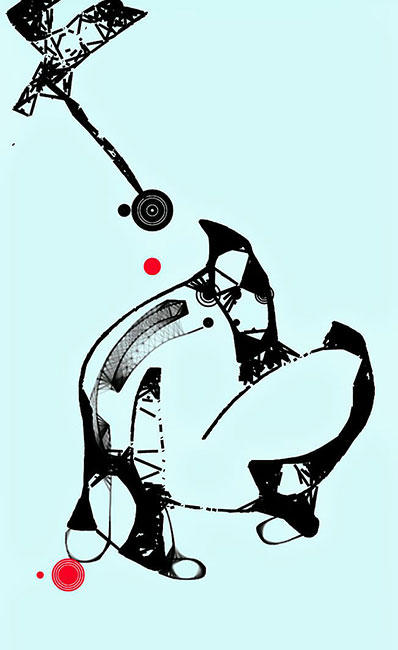
Nighttime taxis remind me of certain piano music, Erik Satie or Gustav Holst.
I wake up dreaming one particular taxi ride with the town as a mute firework, Holst’s Venus, plague masked clown tilting his stovepipe hat, and as a never-ending deserted road.
The night is drawn toward the pallor of the dawn; drowning is not unforeseen. The bird that tweets welcome is the one that bids goodbye. What do I know? The poet lives chained to our basement. Elora may never go to a physical school, and yet we fill a box of tiffin for her with our thinning resources and pack a bag with books and notebooks, and pencils. She may never use a pencil, still, we sharpen their weapon-head as if our muscles follow a covert mission the agency has forgotten. What do I know? The poet lives in the basement and refuses to write what hurts him most.
At night, Prisha often visits the rendezvous point, finds Rita has not arrived as usual. She sees Rita crossing the road, and in a flash, the bus, that will kill her.
I bring Prisha some coffee. We can swap the details of our neighbour’s life. How. Where. When. This. That. She married for love. The marriage was loveless. The son picking up a dead crow from the street limping outside our households. I thought I should say something about this to his mother. My wife remained unsure. Some days later Rita asked if I had noticed anything odd about her child. She had to leave him locked inside their rapidly aging house. I mumbled that there was an incident about one bird. What bird? I stared at my hand. I held one cock bought from the farmers market who sold it in whole, feathers and all, its warm yellow legs tied up in a way the customer might carry it holding the rope. Nothing. I said to Rita.
Prisha, we are not in control of the randomness, even if it originates in us. You know, in their 1988 paper, Taylor and Brown envisaged that ‘Positive Illusions’ deceive us, but we keep ourselves sane and running through self-deceptions.
I do imagine, we shall stumble upon some money. I think we are better than our neighbours. I think I just heard the Poet ringing the wretched bell.
He called us all right. He goes to the toilet, emerges shaved. Saying that a poet is flawed is like saying, metal is cold in winter. He told us.
I shall stroll outside. I ask the Poet if he cares to join me. Should I use collars and leashes on him? I feel content with my dire humour.
He joins me, and so does my wife and our daughter. The street looks cleaner. Prisha, surprised, says that perchance nature has filled in for the sweepers in quarantine. The railings of the pavements display more than a few murders of the crows. One masked newspaper vendor pushes a tired handcart full of bleak ink. One hornbill sits on the overhead cable. When did we see such a bird for the last time in our town? If the rhetorical question is answered negatively there is always a break in the clouds.
We have just enough money to purchase some potatoes, onions, garlic, and ginger. I remind the Poet that he must pay the rent long due.
Did you write to your friends? Prisha asks. I shall. I shall ask for something. The vagueness satisfies her.
Now anything more than nothing feeds the phantasm that tomorrow shall shine brighter than the day itself. We shall don the seat of the drivers.
The mosey is almost over. We stall in front of our house, and then a peripatetic light falls on my daughter’s forehead. A ghostlight, as if the sun has caught the dome-shaped old crystal of some wristwatch belonging to one deceased.
I think Für Elise is haunting. Don’t you agree?
Kushal Poddar words and picture.
@amazon.com/author/kushalpoddar_thepoet
Author Facebook- https://www.facebook.com/KushalTheWriter/
Twitter- https://twitter.com/Kushalpoe
